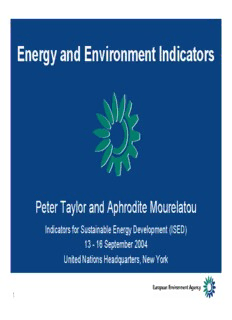
Peter Taylor and Aphrodite Mourelatou PDF
Preview Peter Taylor and Aphrodite Mourelatou
Energy and Environment Indicators Peter Taylor and Aphrodite Mourelatou Indicators for Sustainable Energy Development (ISED) 13 - 16 September 2004 United Nations Headquarters, New York 1 Presentation overview • Introducing the European Environment Agency • Energy and environment indicators • Indicator examples • Other energy and environment work 2 The EEA mission The European Environment Agency is the EU body dedicated to providing sound, independent information on the environment It is the main information source for those involved in developing, adopting, implementing and evaluating environmental policy, and also the general public 3 EEA Activities The Agency is mandated to: • describe the present and foreseeable state of the environment from the points of view of: (i) the quality of the environment (ii) the pressures on the environment (iii) the sensitivity of the environment including placing these in the context of sustainable development. • provide the Community and Member States with the objective information necessary for framing and implementing sound and effective environmental policies Council Regulation No. 1210/1990 as amended by No. 933/1999 4 EEA member and collaborating countries Member countries Collaborating countries 5 Reporting on the environmental impacts of energy use Drivers Responses Increased demand for Policy targets. Pricing. warmth, mobility and Regulation (e.g. technical services. Cheaper, more widely standards). Voluntary available energy sources. agreements. Research. Pressures Impact Greenhouse, acid Damage to natural gas and ozone precursor ecosystems. Biodiversity emissions, particulate loss. Harmful effects on human emissions. Nuclear and other health (respiratory problems, solid wastes. Loss of natural premature death). Erratic State amenities or habitats. weather patterns (increased Depletion of resources. flooding or drought, Visual intrusion and noise. temperature rise). Oil spills. Air pollution. Contaminated soil and water. Abnormal levels of radiation. Increased concentration of greenhouse gases. 63 Energy and environment indicator fact sheet principles • Building blocks of Agency reporting • A tool to manage information requests and to share knowledge among Agency partners • A tool to avoid inconsistencies • Data from recognised international sources (e.g. Eurostat) • Projections from compatible models • Regular updates – to take into account either policy developments or the delivery of new data 7 Energy and environment indicators Development steps 1. Identify key policy questions 2. Identify indicators to answer the questions 3. Develop the indicators by preparing fact sheets for each indicator 4. Produce indicator-based reports on the basis of an integrated reading of the indicator fact sheets 8 Energy and environment policy questions • Is the use of energy having less impact on the environment? • Are we using less energy? • How rapidly is energy efficiency increasing? • Are we switching to less-polluting fuels? • How rapidly are renewable energy technologies being implemented? • Are we moving towards a pricing system that better incorporates environmental costs? 9 Coal / lignite R&D Transport Oil End-user prices Taxes Households Natural gas Industry Subsidies External costs Greenhouse Fossil fuels gases Pricing Particulate Nuclear Fuel mix Air emissions emissions Wind / solar Ozone precursors Hydro Renewables Acidifying Energy and environment emissions performance indicators Biomass Accidental oil Energy intensity tanker spills Conventional Efficiency electricity Consumption Wastes Oil discharges production Electricity Nuclear wastes Energy CHP Ash, slag etc Ratio of final to Renewable total energy electricity Waste from air pollution consumption abatement systems Industry Transport Households 10
Description: